
Top 10 Major League Baseball Fathers and Sons
Fathers and sons have been playing catch with one another for as long as there has been a ball to toss. For these ten families, catch became something more. Baseball entered the bloodline. Here's the top ten father-son combinations (and in a couple of instances grandfather-father-son) where both generations have made the Major Leagues.
10. Tito Francona/Terry Francona
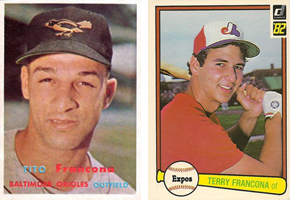
Tito Francona played for nine teams during a career that lasted 15 years. The runner-up for the 1956 American League Rookie of the Year Award, Tito also finished fifth in AL MVP voting in 1959 after hitting .363. Although Terry Francona's playing career lasted a decade, his real impact in the game has been as a manager, guiding the Boston Red Sox to two World Series Championships.
Key Rookie Cards:
9. Tony Gwynn/Tony Gwynn Jr.
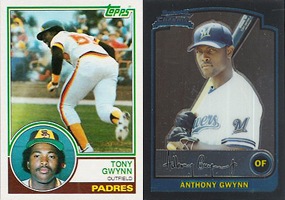
All right, the inclusion of the Gwynn family on this list is somewhat lop-sided. One is a Hall of Famer, an all-time great. The other has made little impact during his first seasons. Tony Gwynn, Sr. played his entire career with the San Diego Padres. He was an eight-time batting champion, finishing with a career average of .338. Other than his first partial season with the Padres, Tony never hit below .300. The 15-time All-Star was elected to the Hall of Fame in 2007. Tony Gwynn, Jr. is still in the early part of his Major League career. However, if he doesn't raise his numbers, it could be a short one. Tony, Jr. has already played for three teams and has yet to hit above .270.
Key Rookie Cards:
8. Gus Bell/Buddy Bell/David Bell and Mike Bell

The Bells are the first three-generation family on the list. The Bell major league bloodline began with Gus Bell. He was an excellent hitter throughout the 1950s, reaching the 100 RBI plateau four times. Gus was a four-time All-Star. Buddy Bell was a solid player during his playing career, winning six consecutive Gold Glove Awards at third base between 1979 and 1984. Bell went on to manage for the Tigers, Rockies and Royals, but failed to lead a team above a third-place finish in their division. David Bell played for seven teams in 12 seasons. His best year was with the Mariners in 1999 where he hit .268 and set career highs in home runs (21) and runs batted in (78). Mike Bell is the youngest of the Bell clan to make the majors. A first-round pick by the Rangers in 1993, Mike spent the next seven years toiling in the minors. He finally reached the majors mid-way through the 2000 season with the Reds. Mike Bell played 19 games and finished with a .222 average.
Key Rookie Cards:
- 1951 Bowman Gus Bell Rookie Card
- 1973 Topps Buddy Bell Rookie Card
- 1994 Topps David Bell Rookie Card (with Jason Giambi, George Arias and Luis Ortiz)
- 1994 SP Mike Bell Rookie Card
7. Sandy Alomar/Roberto Alomar and Sandy Alomar Jr.
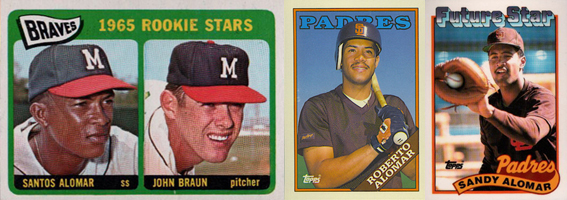
Sandy Alomar, Sr's career didn't last 15 seasons because of his bat. He never hit higher than .269 and his career high for homers was all of four. Since retiring, the baseball matriarch of the Alomar family has been coaching at both the minor and minor league levels. Roberto Alomar was one of the top second basemen during the 1990s. He was a key component to Toronto's back-to-back World Series victories in 1992 and 1993. Roberto was a 12-time All-Star, ten-time Gold Glove winner and four-time Silver Slugger. His career was capped when he was elected to Cooperstown in 2011. Sandy Alomar, Jr. came into baseball as one of the game's top prospects. Although he had a solid career, it's safe to say he quickly fell into his brother's shadow and never emerged from it. Sandy, Jr. played for seven teams during his two-decade career. He was a six-time All-Star and the 1990 American League Rookie of the Year.
Key Rookie Cards:
- 1965 Topps Sandy Alomar Rookie Card (with John Braun)
- 1988 Topps Traded Tiffany Roberto Alomar Rookie Card
- 1989 Topps Tiffany Sandy Alomar Jr. Rookie Card
6. Felipe Alou and Moises Alou
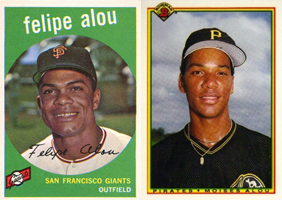
In 17 seasons Felipe Alou had a career batting average of .286. He led the National League in hits twice and made three All-Star appearances. In 1963 he was joined by his brothers Matty and Jesus on the Giants. Together they made up baseball's first all-brother outfield. Felipe went on to become one of baseball's best managers, guiding the Montreal Expos during one of their strongest periods. Alou managed the Expos from 1992 through 2001, winning the 1994 NL Manager of the Year Award. He returned to managing in 2003 with San Francisco and stayed with the team through 2006. Felipe's son Moises was the second-overall pick in the 1986 draft. After playing just five games for the Pirates in 1990, he was traded to the Expos where he went on to emerge as one of baseball's better outfielders. In 17 seasons, Moises hit 332 home runs and was named to six All-Star teams. He drove in more than 100 runs five times.
Key Rookie Cards:
5. Cecil and Prince Fielder
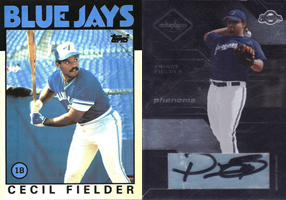
Cecil and Prince Fielder are the best pure slugging father-son duo to play the game. Cecil Fielder's major league journey was an interesting one. After being a part-time player with the Blue Jays and not making much of an impact, Fielder took his bat to Japan for the 1989 season before returning with Detroit in 1990 and becoming an instant superstar. In four seasons with Toronto, Fielder had hit only 31 home runs. In 1990 he hit 51. His torrid hitting continued through the 1996 season. Prince has followed in his father's footsteps, slugging and helping bring the Brewers back into contention. Since his first full season with the Brewers in 2006, Fielder has hit at least 28 home runs. In 2007 he it 50, making him and his dad the only father-son duo to accomplish the feat.
Key Rookie Cards:
- 1986 Topps Tiffany Cecil Fielder Rookie Card
- 2005 Leaf Limited Autographs Prince Fielder Rookie Card (/99)
4. Ray Boone/Bob Boone/Aaron Boone and Bret Boone
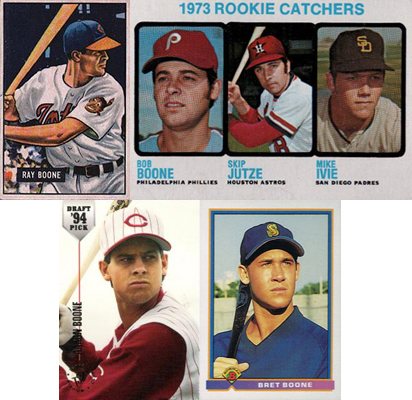
I guess the question is when will the first fourth-generation Boone make his debut? So far the family has had four players spanning three generations play in the majors. Each generation has also landed All-Star nods. In 13 seasons, Ray Boone hit a respectable .275 to go along with 151 home runs. His best years were playing with the Tigers between 1953 and 1956 where he hit at least 20 homers and drove in at least 80 runs each season. Bob Boone made four All-Star teams and won seven Gold Gloves as a catcher. He also went on to manage both the Royals and Reds but never brought his team to a .500 record. Aaron Boone played for six teams over 12 seasons. 2003 was his most memorable year where he made the American League All-Star squad. But the big moment came when he hit a dramatic 11th-inning Game Seven home run to carry the Yankees to another World Series appearance. A decade ago, Bret Boone was one of the best offensive second basemen in baseball. In fact, he was one of the best hitters in the game. In 2001 Bret knocked in 141 runs to go along with 37 homers. He was a three-time All-Star, won four Gold Gloves and two Silver Slugger awards.
Key Rookie Cards:
- 1951 Bowman Ray Boone Rookie Card
- 1973 Topps Bob Boone Rookie Card (with Skip Jutze and Mike Ivie)
- 1994 Stadium Club Draft Picks Aaron Boone Rookie Card
- 1991 Bowman Bret Boone Rookie Card
3. Cal Ripken/Cal Ripken Jr. and Billy Ripken
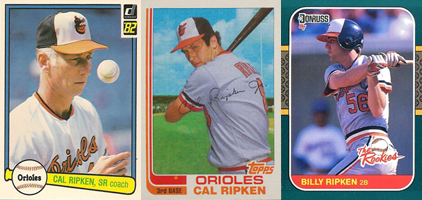
The Ripken legacy is one that carries respect and honor, save for maybe one notorious baseball card. Cal Sr. is most noted for his work as a minor league manager and coach. He spent 13 years managing in the Orioles farm system before finally getting a chance to manage the big league squad. Unfortunately, his tenure didn't last long and he was fired just six games into the 1988 season. Cal Ripken, Jr. is one of the most popular players of his generation who is most remembered for his record "Iron Man" streak of 2,632 consecutive games played. Ripken's other achievements include 19 All-Star Games, two American League Most Valuable Player awards and a World Series Championship in 1983. Billy Ripken didn't have nearly the same impact on the field as his brother, yet a single photograph made his 1989 Fleer Baseball card one of the most infamous of all time. The first version of the card shows that "F*** Face" is written on the end of the bat knob. Ensuing attempts to cover the cardboard faux pas up resulted in several variations of the card. Over the years, the story on the bat's background has become the thing of legend, with the story seemingly changing a little each time its told. Was someone pranking Ripken? Was Ripken sticking it to the card companies? Was Fleer looking to create a stir? Few really know, but that just contributes to the card's iconic status.
Key Rookie Cards:
- 1982 Donruss Cal Ripken Sr. Rookie Card
- 1982 Topps Traded Cal Ripken Jr. Rookie Card
- 1987 Donruss the Rookies Billy Ripken Rookie Card
2. Bobby Bonds/Barry Bonds

With Bobby and Barry Bonds, you've got two players whose off-field antics and attitudes have ultimately overshadowed their tremendous achievements. Bobby was the first player with more than one 30/30 seasons and just the second to reach 300 career home runs and 300 stolen bases. For Barry, the records of single-season and career home runs are two of the biggest in all of sports. But sometimes the bad has a way of overshadowing the good. For the senior Bonds, his drinking killed his career and much of his legacy. For Barry, his entire career has been tarnished due to his suspected steroid use and cold attitude toward those outside of his inner circle.
Key Rookie Cards:
1. Ken Griffey/Ken Griffey Jr.
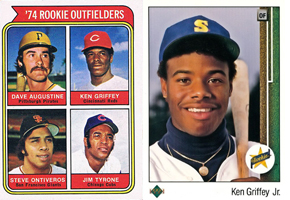
Numbers-wise, perhaps the Bonds family should've taken the top spot on our list. However, the Griffey clan is the clear sentimental favorite. Ken Griffey Jr. is the more accomplished of the two, being one of the most feared hitters throughout the 1990s. In fact, before being traded to his hometown Reds, Griffey was seen to perhaps challenge the all-time home run record. Griffey Jr. was also a hobby star with his 1989 Upper Deck Baseball rookie card ranking as one of the most iconic cards of the modern hobby era. Ken Griffey rose to fame as part of the Big Red Machine in Cincinnati during the 1970s. Although a star in his own right, Griffey Sr. became a superstar after signing with the Seattle Mariners mid-way through the 1990 season to play with his son. Not long after came one of the most sentimental moments in both of their careers when the pair hit back-to-back home runs during the final month of the season.
Key Rookie Cards:
 | Making purchases through affiliate links can earn the site a commission |



























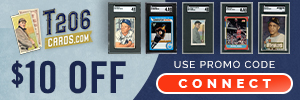
jim
The Griffeys???!! The Best??!! You must be drinking like Bobby Bonds to put the Bonds Family second–The numbers do not lie and its a shame that you so called sports writers have anything to do with the Hall of Fame vote–Where were you when baseball almost died? Oh yea you all benefitted from the so called steroids and protected the players that were nice to you–Biggio??best numbers late in his career–give me a break–